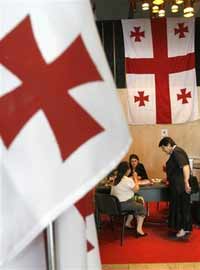Georgia's parliamentary elections turn into international scandal
President Mikhail Saakashvili's pro-Western ruling party faces off in elections Wednesday against opposition forces embittered by a violent crackdown on protesters and a presidential ballot they claim was a fraud.

The U.S. and the European Union will be watching closely because Georgia's frayed ties with Moscow and its location on an export route for Caspian Sea oil and gas that bypasses Russia give it geopolitical importance far greater than its size.
Saakashvili, a staunch ally of the Bush administration with troops in Iraq, hopes to polish his tarnished democratic credentials - crucial to his drive for NATO membership - while maintaining his grip on power despite faded popularity.
Opponents want to weaken Saakashvili by shattering the more than two-thirds majority his United National Movement enjoys in Parliament. Given a big enough win, they could seek the impeachment of a president they call illegitimate.
Opinion polls point to less impressive gains for Saakashvili's opponents, raising the prospect of new protests fueled by claims of electoral violations.
The election is colored by tension over Russia's growing support for the separatist Abkhazia province. But because Saakashvili's opponents share his wariness of Russia and his pro-Western views, the issue is more a platform for scoring points than for major policy debate.
Saakashvili's party faces 11 other political forces in the election for the Parliament's 150 seats, half of which will be filled by nationwide voting for parties and half by voting for individual candidates. Nearly 3.5 million Georgians are eligible to vote. Polls were scheduled to open at 0400 GMT.
The main United Opposition Council and up to three other opposition parties are expected to clear the 5 percent hurdle needed to win seats.
Saakashvili, a U.S.-educated lawyer, was initially elected by a landslide after leading the Rose Revolution protests that ousted his predecessor in 2003. But accusations of authoritarianism and his failure to lift the country out of hardship despite economic growth have dented his popularity.
His crackdown last November, when police used tear gas and water cannon against protesters demanding his resignation, angered Georgians and alarmed Western governments. He was re-elected by a far slimmer margin in January, but the opposition alleged widespread fraud and the West urged Georgia to improve democratic practices.
"In the first presidential election, I was an active supporter of Saakashvili. But after what he did on Nov. 7, I can never vote for him or his supporters," economist Guliko Patridze said after casting her vote in Tbilisi on Wednesday morning.
But Gogita Nebeiridze, 25, said he voted for the governing party because of improvements in the quality of life, including regular electricity supplies.
"Saakashvili has done a lot. Everybody has forgotten how it was when you got electricity according to a schedule, when it was impossible to drive on our roads," he said.
When NATO declined to grant Georgia a road map for membership last month, it stressed that members looked forward to "free and fair parliamentary elections" and scheduled a review of the issue for December.
Georgia has enacted electoral reforms since the presidential vote in a bid to please the West and appease the opposition. Saakashvili has promised honest elections and has sternly warned officials against illegal practices.
But preparations for the vote have received mixed reviews. In an interim report earlier this month, the Organization for Security and Cooperation in Europe's vote monitoring body said "several allegations of intimidation" had been substantiated.
Saakashvili's opponents have alleged campaign violations and warned against fraud in the vote count. Speaking to a crowd of thousands Sunday, United Opposition Council leader Levan Gachechiladze urged supporters to gather after polls close to hear the "real results of the voting."
Disputes over the outcome appear inevitable. Whether they will lead to strong, sustained opposition protests could hinge on how skewed Saakashvili's opponents perceive the election to be.
"If the authorities falsify the results, there will be an explosion," said political analyst Merab Pachulia.
Subscribe to Pravda.Ru Telegram channel, Facebook, RSS!




